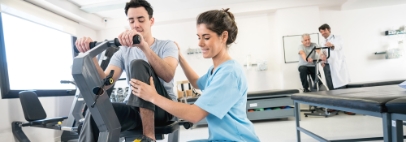Large, weight-bearing joints such as hip and knee joints are susceptible to osteoarthritis with advancing age and are often painfully affected. Shoulder pain is also not uncommon, usually caused by inflammation of soft tissue. The small intervertebral joints of the spine also cause back pain in many people
Many people also experience back pain, and pain in the thumb-saddle joint is very common from the age of 50.
Frequently asked questions about the musculoskeletal system
Do you have any uncertainties or concerns within our speciality?
We have compiled the most frequently asked questions about the musculoskeletal system, answered by our medical experts.
Do you have any other questions that are not answered here?
Please feel free to contact us - we will be happy to help.
FAQs on rheumatism/pain
We have compiled the most frequently asked questions about rheumatism/pain, answered by our medical experts.
Do you have any other questions that are not answered here? Please feel free to contact us - we will be happy to help you.
Fortunately not! However, if the pain persists for a long time and/or at night, as well as in the case of prolonged joint stiffness in the morning, a specialist assessment should definitely be carried out. In such cases, joint pain could be a symptom of a systemic inflammatory disease, which can damage internal organs as well as the joints.
Such pain is most frequently caused by wear and tear of the joint cartilage (osteoarthritis) or inflammation of the surrounding soft tissue, e.g. bursae. Joint capsule pain is also common, but often unrecognised, in people with congenital joint hyperextensibility (hypermotility)
(hypermotility). Approximately 3% of the population suffers from an inflammatory cause. The most common is metabolic pseudogout or chondrocalcinosis, which is "related" to gout, which is also common. Rheumatoid arthritis, which affects 1% of the population and can lead to disability without treatment, is also not uncommon.
Unfortunately, no. Inflammatory joint diseases can also occur in young people, even children. Inflammatory rheumatism in children and adolescents often progresses aggressively and requires rapid and effective anti-inflammatory therapy. The following applies: A thick and/or overheated joint should always be promptly examined by a specialist, regardless of the patient's age.
Yes, in the case of metabolic joint diseases, large joints such as the shoulder or knee joint can be completely destroyed, so that only the use of a joint prosthesis can help. In large weight-bearing joints, especially the hip joint, an infarction of the joint head, known as head necrosis, can also occur, which also requires prosthetic treatment.
No, this should no longer happen in this day and age. With early diagnosis and treatment of an inflammatory joint disease, the previous quality of life can be restored in most cases. In cases of chronic back pain, we often successfully use targeted infiltration of the small vertebral joints under X-ray control, followed by physiotherapy. Great progress has also been made in joint prosthetics over the last 20 years. It is often the case that patients who have been plagued by severe hip arthrosis and severe pain for years are able to walk again without pain within a very short time after a hip prosthesis has been fitted.
We usually diagnose an inflammatory joint or soft tissue disease on the same day in our outpatient arthritis consultation. In addition to the clinical examination and the laboratory, we have highly sensitive ultrasound equipment at our disposal, which allows us to view the joints and inflammatory processes with millimetre precision. The categorisation of an inflammatory disease sometimes takes a little longer, as we have to wait for laboratory results. However, we usually make the diagnosis within 2-4 weeks, and in most cases we start treatment on the day of the initial consultation.
We then discuss all relevant findings with the patient. Once we have jointly selected the treatment, we inform the patient about the risks and the necessary follow-up checks. We also discuss the physiotherapeutic and physical options, particularly in the case of soft tissue and osteoarthritis pain. Physiotherapy and, for example, the application of heat or water therapy, play a very important role here, and we therefore also discuss this treatment and the course of therapy with our physiotherapists. If severe osteoarthritis is found to be the cause of pain, e.g. in the knee, we utilise the interdisciplinary services available in-house and refer the patient to the Orthopaedics Clinic at Bethesda Hospital on request.
FAQs on spinal surgery
We have compiled the most frequently asked questions about spinal complaints, answered by our medical experts.
Do you have any other questions that are not answered here? Please feel free to contact us - we will be happy to help you.
Degenerative diseases occur in old age and can make life more difficult. Spinal canal stenosis, for example, is one of the most common clinical pictures. The disease is characterised by the fact that those affected can only walk short distances, but cycling, for example, is no problem
is not a problem. These symptoms should be investigated by experienced medical professionals.
If a vertebra fractures due to osteoporosis, for example, severe pain suddenly occurs in the back. This can be triggered by harmless falls or even light lifting, and sometimes the fractures occur spontaneously. Later, a vertebral fracture can lead to considerable changes in the shape of the spine and permanently disable those affected. Early detection and treatment is therefore important.
The surgeon's task is not only to operate, but also to assess where it is necessary or sensible and where surgery is not necessary. It is therefore an advantage if we can monitor and observe the progress at an early stage. In many cases, conservative treatment is sufficient.
FAQs on physiotherapy
In principle, you need a prescription. Your doctor will clarify whether your complaint is a dangerous situation and will then issue you with a prescription. Bethesda Hospital offers an emergency consultation for acute cases.
If you have already been to us for treatment for the same problem, you can also make appointments as a self-payer without a prescription.
Your prescription will be issued by your doctor. The therapy must then be started within five weeks of the date of issue.
The best way to book an appointment is to contact us by telephone. Please note that we need your therapy prescription in order to allocate appointments. You can send this to us by post, e-mail or in person.
We require the original prescription before starting therapy. Please bring this to the registration desk for your first appointment at the latest.
If you are unable to keep an appointment as planned, please cancel at least 24 hours in advance. Otherwise we will have to charge you privately for the appointment. You can also leave messages on the answering machine at weekends or after 6.00 pm.
After the 6th therapy session, you should discuss with your therapist whether a further series of therapy sessions is necessary. In the event of a continuation, we require a new prescription in good time. Continuation without a doctor's prescription is possible as a self-payer.
From the second series of prescriptions onwards, we will apply to your insurance company for a cost approval. This will usually be answered within 10 working days. If you would like to continue the therapy in the meantime without a confirmation, this is possible as a self-payer. In this case, you agree to pay the costs yourself if the health insurance company rejects the cost approval.
At your first appointment, your therapist will conduct a detailed intake interview with you in order to get a comprehensive picture of your problem and to be able to plan the therapy in a targeted manner.
Think about your expectations and specific goals beforehand and make a note of your questions. This will help us to optimise your therapy together with you.
Your therapists will be waiting for you in the exercise pool at the agreed time. Please bring your personal swimwear and towel. Showering before therapy is obligatory.
The general hygiene guidelines apply. For safety reasons, we ask that you only enter the water when your therapist is present.
Yes, we plan your appointments for all departments centrally at our registration desk. If appointments are available, we will organise your schedule according to your wishes.
Yes, most therapists offer inpatient and outpatient appointments. This ensures a seamless transition from hospital to home.
Yes, many other languages are spoken in our large team in addition to German. These include English, French, Italian, Spanish, Portuguese, Turkish and Serbian.
FAQs on occupational therapy
With a prescription from a doctor, you can make an appointment for occupational therapy by e-mail or telephone.
Occupational therapy at Bethesda only treats problems with the hand and forearm.
It is generally possible to combine appointments for hand surgery and occupational therapy.
Yes, we plan your appointments for all departments centrally at our registration desk. If appointments are available, we will organise your schedule according to your wishes.
Yes, many other languages are spoken in our large team in addition to German. These include English, French, Italian, Spanish, Portuguese, Turkish and Serbian.
Yes, most therapists offer inpatient and outpatient appointments. This ensures a seamless transition from hospital to home.
FAQs on medical training therapy
No, not compulsory.
After an injury or during rehabilitation, you can train in our medical training therapy centre on prescription.
However, you also have the option of training in our MTT without a prescription and at your own expense.
You can find out about the current tariffs under this link.
In the case of medical training therapy on prescription, you will be individually instructed by a physiotherapist at your first appointment. You will then train independently under the supervision of our MTT team.
Before and after physiotherapy, the equipment is available to you for a "warm up" and "cool down" in consultation with your therapist. For optimum training results and your safety, we ask you to follow the training recommendations of your therapist/trainer.
medical Training Therapy (MTT) is located on the 1st basement floor. Please follow the signs.
Please wear suitable sportswear (no street shoes) and bring a small towel.
No. After your introduction, you can train independently during training times.
Our MTT is open seven days a week. You can find the exact times under this link.
Your advantages at Bethesda Hospital
We provide interdisciplinary excellence in medicine, care and therapy, promote innovation and are at the cutting edge of research and technology. Personalised care in a family atmosphere, our excellent hotel facilities and the quiet location in the park support your recovery.
.jpg)

